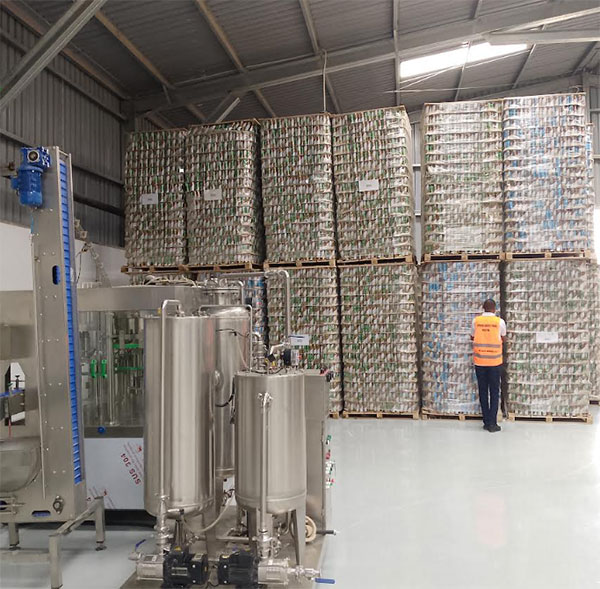
From coffee beans to billion-dollar dreams, Tugume is brewing a revolution in Uganda’s highlands—one innovation at a time
Ntungamo, Uganda | JULIUS BUSINGE | In the rolling hills of Rwashemire, Ntungamo district, a bold business dream is taking shape—one that promises to redefine Uganda’s coffee economy and transform its role on the global stage. The Africa Coffee Park, spearheaded by visionary entrepreneur Nelson Tugume, is not just a factory. It is a mission.
During a recent visit by a delegation of journalists from July 24–26, Tugume unveiled his long-term vision: to build Africa’s first integrated coffee industrial and tourism city.
“This is not just about coffee. We are creating an innovation city with an international airport, a convention centre, an IT hub, and leisure spaces,” Tugume said with characteristic confidence.
Spread across hundreds of acres, the Park will process a wide array of value-added coffee products including instant coffee, drip packs, malt coffee, energy drinks and cosmetics. These high-margin products, Tugume believes, will flip Uganda’s traditional model of exporting raw beans—often sold at about USD 2.50 per kilogram—in favour of finished goods that can fetch up to USD 40 per kilogram on international markets.
Tugume’s strategy is both audacious and focused on economic transformation. “Our long-term plan is to open six other hubs across Uganda,” he said. “In 20 years, no coffee bean should leave Uganda unprocessed.”
Transforming the farmer economy
One of the project’s biggest draws is its approach to working with smallholder farmers. The Park begins purchasing coffee at about Shs 12,000 per kilo, far above the current market average of Shs 9,000. Tugume explained that farmers will be enrolled into an AI-enabled traceability system that allows the Park to monitor crop quality and engage directly with producers.
“This Park is for the farmers,” he said. “It is about better incomes, better livelihoods, and dignity for the Ugandan coffee grower.”
He added that government involvement accounts for around 30% of the project’s total investment, with Shs 12 billion already spent on compensating families that had to relocate to make way for the development.
“The perception that I received money from President Museveni is completely false. Government is the smallest investor here,” Tugume clarified, addressing growing speculation around the project’s financing.
Resilience, innovation and criticism
A globetrotter who has studied business and supply chains across Europe, Asia, and the Americas, Tugume said his ambition is shaped by exposure.
“I’ve travelled widely to learn and to look for partners,” he noted. “This is about serious collaboration. I want to work with people who believe in Africa and are ready to build it.”
To Uganda’s youth, Tugume had a message: “You need resilience. The world is not built for the passive. Be innovative, be aggressive, and above all—collaborate. No one builds alone.”
Despite the promise, the project has not been without controversy. A team of Members of Parliament led by Leader of the Opposition Joel Ssenyonyi visited the Park and expressed concerns over transparency. They questioned the lack of a formal Memorandum of Understanding between the government and Inspire Africa Group, calling for public clarity before further public funds are committed.
Even so, Ssenyonyi acknowledged the Park’s potential, saying it could be a model for similar investments in Bugisu, Masaka, and Rwenzori—regions equally rich in coffee but lacking infrastructure for real-time value addition.
In March, the Parliamentary Committee on Science, Technology, and Innovation toured the Park and lauded its impact on local communities, particularly in job creation and farmer engagement. The committee, however, also echoed the call for more accountability and public information. Tugeme said, the Park currently employs 600 people.

Uganda’s global coffee ranking
Uganda continues to assert itself as a coffee giant. Ranked 6th globally in total coffee production and 1st in Africa for Robusta exports, the country produced around 8.2 million 60-kg bags in 2024, with plans to grow that number to 20 million by 2030.
Coffee remains Uganda’s leading export crop, accounting for 22.6% of export earnings and supporting about 12.5 million livelihoods.
Global demand for coffee—especially single-origin and ready-to-drink (RTD) products—is on the rise. With coffee prices surging due to climate shocks and geopolitical trade disruptions, Uganda stands to benefit from a robust and value-driven sector, said Brendah Akankunda, National Coordinator, International Trade Centre during the visit.
The vision lives on
Despite the friction, Tugume remains committed. “Uganda resists its own entrepreneurs while celebrating foreigners,” he said with emotion. “But we are here. We are not leaving. We are building something this country has never seen before.”
The Africa Coffee Park stands today not just as a construction project, but as a declaration—that Uganda can own its narrative, add value to its exports, and create generational wealth by investing in bold ideas.
 The Independent Uganda: You get the Truth we Pay the Price
The Independent Uganda: You get the Truth we Pay the Price




Thanks for loving your country
Great work Mr Nelson.The country celebrates your your insightful innovations
It is tons of work ahead of us Ugandans to see this dream come true.Thanks for the initiative.
Thanks Mr Tuguume for your innovative vision, God bless you.I also have a vision of reducing the cost of sauce as a source of human nutrition, so I need more moral and financial support.Long live Uganda and Ugandans.
Thank you Mr.Tugume for innovation. Let our cocoffee be valued so that ugandan coffee can benefit from their sweats